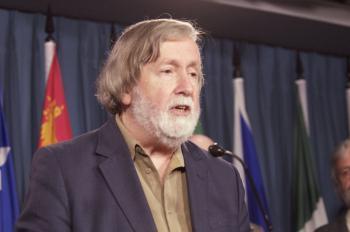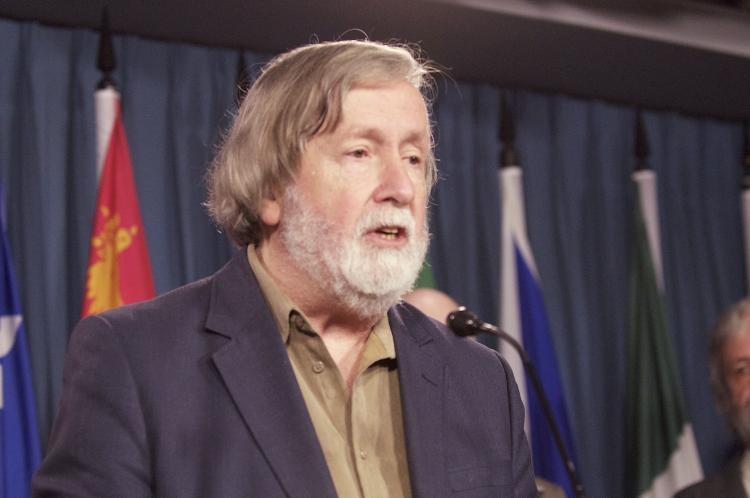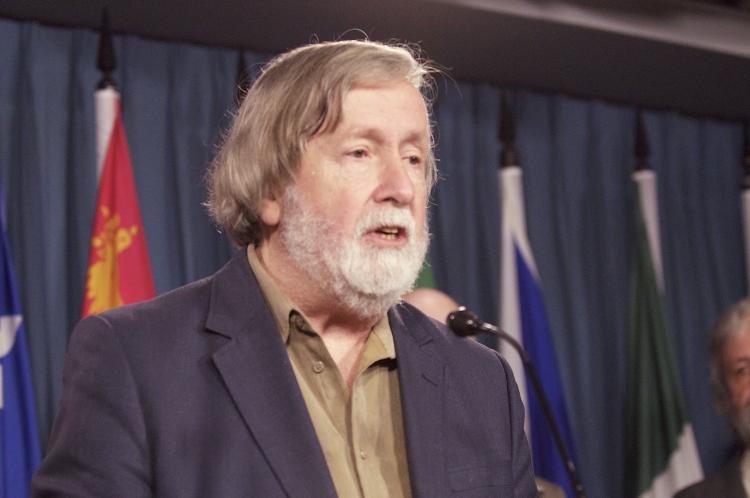OTTAWA—A Canadian nuclear utility is facing fury from environmentalists over its plan to send decommissioned nuclear generators to Sweden to be partially recycled.
The Canadian Nuclear Safety Commission gave Bruce Power license to ship the 16 bus-sized steam generators last month on a route that will see them traverse the Great Lakes and the St. Lawrence Seaway.
Weather will delay the shipment until spring, but lawyers for environmental groups hope to delay it longer through an injunction to stop the last license needed for the Canadian portion of the route. Other approvals are still needed from the United States, United Kingdom, and Sweden.
Michael Binder, CEO of the commission, told a Parliamentary committee on Tuesday that by the time the shipment gets all its approvals it will have passed a rigorous review.
“This will be the safest shipping of any hazardous material I can think of,” he said.
But the Canadian Coalition for Nuclear Responsibility says the shipment sets a dangerous precedent, representing the first time radioactive waste will be exported or imported from a refurbished Canadian nuclear reactor. If approved, more would follow, including Bruce Power’s other 48 generators.
“We are going to have a highway of nuclear garbage,” Gordon Edwards, Canadian co-chair of the Great Lakes United Task Force, told reporters Tuesday morning.
It will also be the first time radioactive waste from Canadian nuclear reactors will have been introduced into the world’s scrap metal market.
Before Sweden’s Studsvik Inc. developed technology to melt down the generators and separate the most contaminated waste, Bruce Power was under obligation to store them indefinitely in large specialized buildings. With processing, the radioactive waste will be reduced enough to fit into a building sized for a single generator and then shipped back to Canada. The rest of the metal will be sold into the scrap metal market and could end up in consumer products, a fact environmentalists are also concerned about.
Studsvik signed a $34 million contract with Bruce Power in 2009 and was to start treating 16 generators last year before the shipment was delayed.
Binder said the shipment is nothing unusual except the material cannot fit in internationally approved containers and so required a special permit.
“This is routine activity with no safety issues,” he told the committee.
In his presentation, the CEO noted Canada shipped 7,000 tons of yellowcake uranium—uranium concentrate powder used to make nuclear fuel bundles—along St. Lawrence Seaway in 2009, not to mention medical isotopes and other radioactive substances transported through airplanes. The only difference between those shipments and this one is the size of the packages, he said.
Edwards disagrees, describing the shipment as “radioactive roulette,” and his group has gained support from over 200 municipalities along the route who are opposed to the shipment.
The Canadian Nuclear Safety Commission gave Bruce Power license to ship the 16 bus-sized steam generators last month on a route that will see them traverse the Great Lakes and the St. Lawrence Seaway.
Weather will delay the shipment until spring, but lawyers for environmental groups hope to delay it longer through an injunction to stop the last license needed for the Canadian portion of the route. Other approvals are still needed from the United States, United Kingdom, and Sweden.
Michael Binder, CEO of the commission, told a Parliamentary committee on Tuesday that by the time the shipment gets all its approvals it will have passed a rigorous review.
“This will be the safest shipping of any hazardous material I can think of,” he said.
But the Canadian Coalition for Nuclear Responsibility says the shipment sets a dangerous precedent, representing the first time radioactive waste will be exported or imported from a refurbished Canadian nuclear reactor. If approved, more would follow, including Bruce Power’s other 48 generators.
“We are going to have a highway of nuclear garbage,” Gordon Edwards, Canadian co-chair of the Great Lakes United Task Force, told reporters Tuesday morning.
It will also be the first time radioactive waste from Canadian nuclear reactors will have been introduced into the world’s scrap metal market.
Before Sweden’s Studsvik Inc. developed technology to melt down the generators and separate the most contaminated waste, Bruce Power was under obligation to store them indefinitely in large specialized buildings. With processing, the radioactive waste will be reduced enough to fit into a building sized for a single generator and then shipped back to Canada. The rest of the metal will be sold into the scrap metal market and could end up in consumer products, a fact environmentalists are also concerned about.
Studsvik signed a $34 million contract with Bruce Power in 2009 and was to start treating 16 generators last year before the shipment was delayed.
Binder said the shipment is nothing unusual except the material cannot fit in internationally approved containers and so required a special permit.
“This is routine activity with no safety issues,” he told the committee.
In his presentation, the CEO noted Canada shipped 7,000 tons of yellowcake uranium—uranium concentrate powder used to make nuclear fuel bundles—along St. Lawrence Seaway in 2009, not to mention medical isotopes and other radioactive substances transported through airplanes. The only difference between those shipments and this one is the size of the packages, he said.
Edwards disagrees, describing the shipment as “radioactive roulette,” and his group has gained support from over 200 municipalities along the route who are opposed to the shipment.







